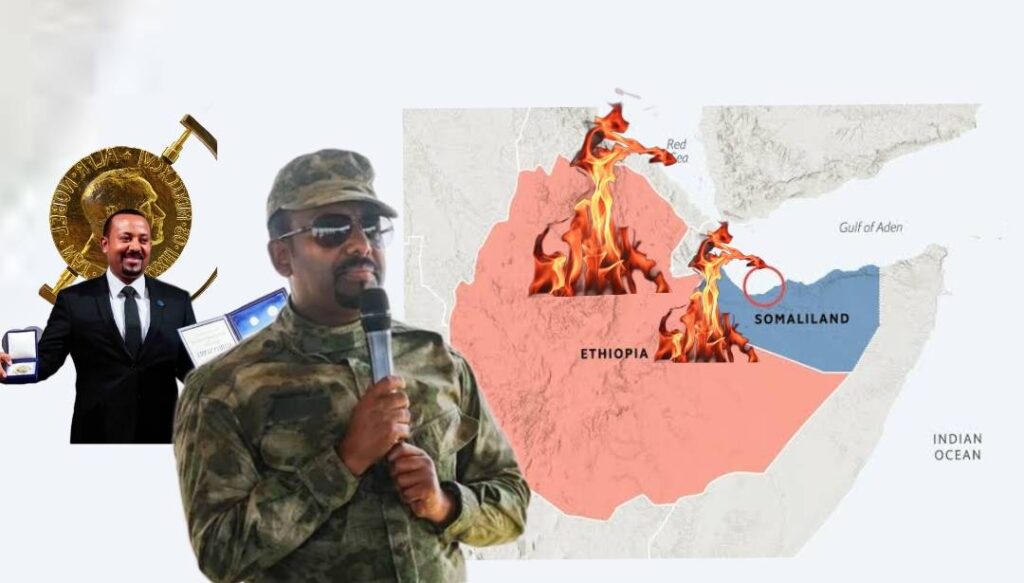Ethiopia is engulfed in a conflict from all sides, primarily influenced by the actions of Prime Minister Abiy Ahmed. The repercussions of this turmoil extend to the neighboring countries.
A military clash in a disputed border area between two states in northern Ethiopia recently set alarm bells ringing at Western embassies in the capital Addis Ababa. At the beginning of April, the armies from the states of Tigray and Amhara fought each other near the town of Alamata. According to the United Nations, fifty thousand civilians were displaced. Yet another war would mark a significant escalation in the unraveling Ethiopia has been undergoing since Abiy Ahmed became prime minister in 2018.
Ethiopia, with its eighty ethnic groups, has historically been a nation facing fragility. Currently, the country is experiencing divisions from all sides. It is ironic that numerous conflicts began during the leadership of Abiy Ahmed, the recipient of the Nobel Peace Prize in 2018.
Ethiopia is a strategically located country in the Horn of Africa. What happens in the highlands of Ethiopia, home to 120 million people, affects the surrounding lowlands in Sudan and Somalia, as well as across the Red Sea. The United Arab Emirates (UAE) has become an important factor in not only Ethiopia but also Sudan through its arms supplies and financial support to Abiy Ahmed.
The new tensions are a follow-up to the major war between 2020 and 2022, when the Ethiopian government army fought together with Eritrea and regional forces from Amhara against the army of Tigray, which was then defeated.
This bloodiest war so far this century was in Tigray. The casualties included a staggering number of civilians and soldiers, ranging from half a million to 800,000. Additionally, around a million Tigreans were forced into displaced persons camps. The United Nations reported that the Ethiopian and Eritrean armies in Tigray deliberately withheld food aid, leading to starvation among the population. They sabotaged the agricultural sector, resulting in a 50% reduction in harvest and pushing over two million citizens to the brink of famine. Abiy Ahmed recruited soldiers from the Fano militia, hailing from Amhara state, in the Tigray conflict, enticing them with promises of land and war spoils. The militiamen seized control of significant portions of western and southern Tigray, forcibly displacing Tigrean civilians residing there. Numerous human rights organizations condemned these actions as ethnic cleansing. Eventually, the disastrous war concluded with the Pretoria agreement in late 2022.
The war in Tigray almost immediately led to yet another violent conflict, this time in Amhara. Abiy Ahmed did not include Fano and other deployed Amharic forces in the peace deal. When they ignored his orders to disarm, they moved into the countryside and fought the central government in Addis Ababa. In addition to this war in Amhara, insurgents are also fighting against the prime minister in the area where the country’s largest population group, the Oromos, live.
Somaliland
The volatile Abiy Ahmed is also making himself heard outside Ethiopia. A major row with Somalia arose at the beginning of this year when the prime minister unexpectedly concluded a deal with Somaliland, a part of Somalia that unilaterally declared independence in 1991. In exchange for about fifty square kilometer piece of land along the Red Sea for an Ethiopian naval base, Ethiopia promised to be the only African state to recognize Somaliland. Abiy Ahmed wants a military presence alongside the United States, China and France, which already have military bases along the Red Sea and the Gulf of Aden. The Prime Minister provoked a wave of diplomatic outrage with the deal.
Somali President Hassan Mohammed flew into a rage. According to him, the unrecognized Somaliland is not authorized to conclude an agreement with Ethiopia. He recalled his ambassador from Addis Ababa and declared his willingness to start a war with Ethiopia. Such a war, while unlikely given the weakness of the Somali army, could weaken the common fight of all countries in the region against the terrorist group Al Shabaab in Somalia.
Subsequently, Puntland, a semi-autonomous state of Somalia, stopped participating in the federal Somali government due to a disagreement over a constitutional amendment. Ethiopia immediately reached out to Puntland. Somalia responded by expelling the Ethiopian ambassador in the capital Mogadishu. In this way, the mutual relationships between states and federated states in the region are being thrown into disarray by Abiy Ahmed’s wild maneuvering.
Anti-Piracy Brigade
The UAE’s backing serves as a major advantage. According to Africa Confidential, this financially influential country has contributed a staggering 56 billion euros to Africa in the last decade, with an additional 9.3 billion euros pledged for green energy initiatives. Alongside China, the United States, and the European Union, the UAE has become one of the primary contributors to the continent. Notably, it has established management agreements for ports along the Red Sea, including Berbera in Somaliland and Bosaso in Puntland, and has also formed an anti-piracy brigade.
The UAE is also becoming increasingly important militarily. Arms deliveries, in particular drones, to Abiy Ahmed were the deciding factor in the war in Tigray two years ago. This also applies to Sudan. An airlift to Chad transported so much military weaponry to the rebel General Hemedti that his paramilitary Rapid Support Forces gained the upper hand in the Sudanese civil war. The UAE is also working with military factions in Libya and Yemen.
Egypt, Saudi Arabia, Eritrea and Somalia view the growing influence of both the UAE and Ethiopia with suspicion. They support Sudan’s president General Burhan in the war against Hemedti. For example, the Horn of Africa has become more unstable than at any time in the past quarter century.
This article was first published in NRC on 1-5-2024

